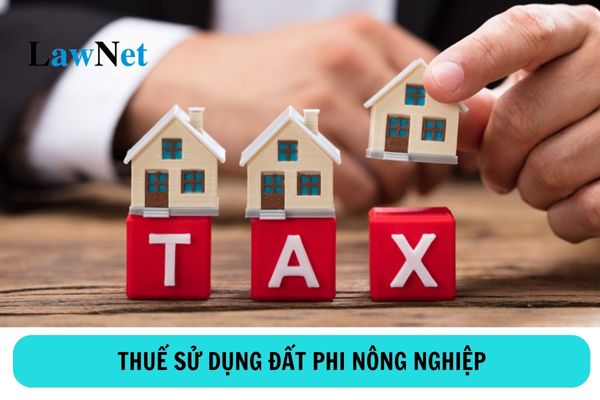What are objects subject to non-agricultural land use tax in Vietnam?
What are objects subject to non-agricultural land use tax in Vietnam?
According to the provisions of Article 2 of Law on Non-Agricultural Land Use Tax 2010, objects subject to non-agricultural land use tax in Vietnam include:
- Residential land in rural and urban areas.
- Non-agricultural production and business land, including land for the construction of industrial parks; land for the construction of production and business establishments; land for mineral exploitation and processing; and land for the production of construction materials and pottery articles.
- Non-agricultural land specified in Article 3 of Law on Non-Agricultural Land Use Tax 2010 which is used for commercial purposes.

What are objects subject to non-agricultural land use tax in Vietnam? (Image from the Internet)
What are the objects not liable to non-agricultural land use tax in Vietnam?
According to the provisions of Article 3 Law on Non-Agricultural Land Use Tax 2010, objects not liable to non-agricultural land use tax in Vietnam are non-agricultural land used for purposes other than commercial ones, including:
- Land used for public purposes, including traffic and irrigation land, land for the construction of cultural, healthcare, education and training, and physical training and sports works for public interests; land with historicalcultural relics or scenic places; and land for the construction of other public works under the Government’s regulations;
- Land used by religious institutions;
- Land used for cemeteries and graveyards;
- Land under rivers, canals, ditches, streams and special-use water surface;
- Land with communal houses, temples, worship halls or clans’ worship houses;
- Land for the construction of working offices or non-business works or for national defense and security purposes;
- Other non-agricultural land provided for by law.
What are the regulations on non-agricultural land use taxpayers in Vietnam?
Under Article 4 of Law on Non-Agricultural Land Use Tax 2010, the regulations on non-agricultural land use taxpayers are as follows:
- Taxpayers are organizations, households and individuals that have the right to use tax-liable land specified in Article 2 of Law on Non-Agricultural Land Use Tax 2010.
- When organizations, households or individuals have not yet been granted land use right certi-ficates or house and land-attached asset ownership certificates (below collectively referred to as certificates), current land users will be taxpayers.
- Taxpayers in some cases are specified as follows:
- When land is leased by the State for the implementation of investment projects, lessees will be taxpayers;
- When persons having land use rights lease land under contracts, taxpayers shall be identified as agreed upon in these contracts. When no agreement on taxpayers is made in contracts, persons having land use rights will be taxpayers;
- When land has been granted a certificate but is currently under dispute, pending the dispute settlement, current land users will be taxpayers. Tax payment does not serve as a ground for the settlement of disputes over land use rights;
- When many persons have the right to co-use a land plot, the lawful representative of these co-users will be the taxpayer;
- When a person having land use rights contributes his/her land use rights as business capital, thereby forming a new legal entity that has the right to use tax-liable land specified in Article 2 of Law on Non-Agricultural Land Use Tax 2010, the new legal entity will be the taxpayer.
What are the regulations on taxable price for non-agricultural land use taxpayers in Vietnam?
According to Article 6 Law on Non-Agricultural Land Use Tax 2010 as amended by Article 249 Land Law 2024, the regulations on the taxable price for non-agricultural land use taxpayers in Vietnam are as follows:
- The tax base for land is determined by the taxable land area multiplied by the price per square meter of land.
- The taxable land area is regulated as follows:
+ The taxable land area is the actual land area used.
In cases of multiple parcels of residential land, the taxable land area is the total area of all taxable parcels.
In cases where the State allocates or leases land to construct industrial zones, the taxable land area does not include the area used for constructing shared infrastructure;
+ For homestead land with multi-story multi-household houses, apartment buildings including cases used for both residential and business purposes, the taxable land area is determined by the allocation coefficient multiplied by the house area of each organization, household, or individual using it.
The allocation coefficient is determined by dividing the land area used for constructing multi-story multi-household houses, apartment buildings by the total house area used by organizations, households, or individuals.
In cases where multi-story multi-household houses, apartment buildings have basements, 50% of the basement area used by organizations, households, or individuals in the basement is added to the house area used by organizations, households, or individuals to calculate the allocation coefficient;
+ For underground construction works, an allocation coefficient of 0.5 is applied by dividing the land area used for construction by the total area of the construction used by organizations, households, or individuals.
- The price per square meter of land is the land price according to the land price table corresponding to the purpose of use and is stable for a cycle of 5 years.

